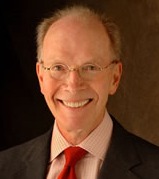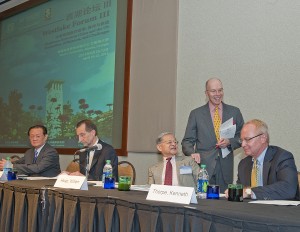The obesity epidemic took center stage at this year’s American Association of Clinical Chemistry (AACC) Annual Meeting. Several Emory experts took the podium to further explore obesity not only as a public health problem, but also as an issue that is changing the way we diagnose diseases and treat health issues in children.
Jeffrey Koplan, MD, MPH, director of the Emory Global Health Institute, led one of the meeting’s plenary sessions, emphasizing that obesity must be fought with changes in both public policy and personal decision-making. Koplan also noted that strategies to address obesity must be localized to fit each community because eating and exercise habits are often culturally specific.
Rising rates of obesity also are changing the way physicians and researchers define and diagnose certain diseases, including metabolic syndrome, a cluster of risk factors including insulin resistance, high blood pressure, cholesterol abnormalities and an increased risk for clotting. The common thread among patients with metabolic syndrome is that they are often overweight or obese.
Pathologist Ross Molinaro, PhD, medical director of the Core Laboratory at Emory University Hospital Midtown and co-director of the Emory Clinical Translational Research Laboratory, presented insights into the important role of lab testing in the definition and diagnosis of metabolic syndrome. Â In addition to new markers, Molinaro addressed the global prevalence of metabolic syndrome and the evolving criteria for diagnosis.
Responding to their members’ demand for more information on how obesity affects children, the AACC hosted a full-day symposium on pediatric obesity and related health complications such as diabetes and high blood pressure. Miriam Vos, MD, MSPH, assistant professor of pediatrics in Emory School of Medicine and a physician at Children’s Healthcare of Atlanta described non-alcoholic fatty liver disease as an increasingly common complication of childhood obesity that can cause inflammation and scarring of the liver.
Stephanie Walsh, MD, assistant professor of pediatrics in Emory School of Medicine and medical director of child wellness at Children’s Healthcare of Atlanta, leads Children’s efforts in preventing and treating childhood obesity in Georgia, which currently has the second highest rate of childhood obesity in the country. Walsh addressed the effect of Children’s wellness initiative, called Strong4Life, on childhood obesity prevention in Georgia.
“From those in the lab, to those in clinic, to those who strategize and implement public health campaigns, we’re all going to need to work together to protect our children’s future,†says Walsh.
















